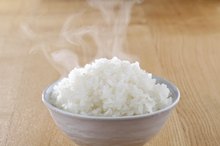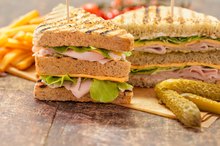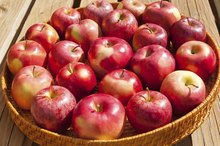What does fact checked mean?
At Healthfully, we strive to deliver objective content that is accurate and up-to-date. Our team periodically reviews articles in order to ensure content quality. The sources cited below consist of evidence from peer-reviewed journals, prominent medical organizations, academic associations, and government data.
- MayoClinic.com; High-Fiber Foods; Mayo Clinic Staff; November 17, 2009
- National Digestive Diseases Information Clearinghouse; What I Need to Know About Constipation
- FamilyDoctor.org: Constipation
The information contained on this site is for informational purposes only, and should not be used as a substitute for the advice of a professional health care provider. Please check with the appropriate physician regarding health questions and concerns. Although we strive to deliver accurate and up-to-date information, no guarantee to that effect is made.
Are Rice & Beans Good for Constipation?
A fiber-rich diet is one of your best defenses against digestive problems like constipation 2. The occasional discomfort from slow-moving bowels occurs in most people, but constipation is characterized by three bowel movements or less per week 2. If you experience constipation, consult your physician and consider adding high-fiber foods like rice and beans to your diet to prevent recurrence 2.
Digestion and Constipation
During the breakdown of food through your digestive tract, your body extracts the nutrients and fluids it needs, then sends what is not needed to your large intestine, or colon, as waste. Fiber in your colon helps to retain water to soften the waste and the muscles in your colon slowly contract, pushing the waste toward your rectum for elimination. If you eat too many foods high in fat and not enough foods with fiber, your stool becomes hard and dry, resulting in slowed or stopped movement through the bowels.
Daily Fiber
Rice & Constipation
Learn More
The daily recommendation for fiber is 25 to 35 g to maintain digestive regularity. Fiber-rich foods include fresh fruits, vegetables and whole grains. Consumption of fiber daily can prevent constipation because it helps form soft, bulky stool 2. Animal-based foods like dairy and meat do not contain fiber. Processed foods like white grains, snack chips or candies and frozen dinners generally have minimal fiber.
- The daily recommendation for fiber is 25 to 35 g to maintain digestive regularity.
- Animal-based foods like dairy and meat do not contain fiber.
Rice and Beans
Rice is a fibrous grain that can help you maintain bowel regularity. Choose brown and wild rice varieties for 3 to 3.5 g of fiber per 1-cup serving over white rice, which has .6 g of fiber for the same serving. Beans are a high-fiber food, yielding 6.2 to 9.5 g of fiber for 1/2 cup servings. Kidney, navy, black and pinto beans mixed with rice make a fiber-rich meal to ease constipation 2. Add rice and beans as a meal on occasion, but for best results, enjoy different fibrous foods in your meals daily.
- Rice is a fibrous grain that can help you maintain bowel regularity.
- Choose brown and wild rice varieties for 3 to 3.5 g of fiber per 1-cup serving over white rice, which has.6 g of fiber for the same serving.
Additional Tips
How to Use Stool Softeners
Learn More
Drink plenty of water daily to prevent dehydration when you are constipated and to help digest fiber. Moderate daily exercise at 20 to 30 minutes a day also aids in digestive regulation. If you are constipated, do not strain to use the toilet because this could result in hemorrhoids. Avoid use of laxatives, which may make constipation worse 2. Talk to your physician about dietary changes that work best for your condition.
- Drink plenty of water daily to prevent dehydration when you are constipated and to help digest fiber.
- If you are constipated, do not strain to use the toilet because this could result in hemorrhoids.
Related Articles
References
Writer Bio
Aubri John has been a contributing researcher and writer to online physical and mental health oriented journals since 2005. John publishes online health and fitness articles that coincide with her licensed clinical skills in addictions, psychology and medical care. She has a master's degree in clinical social work and a Ph.D. in health psychology.









